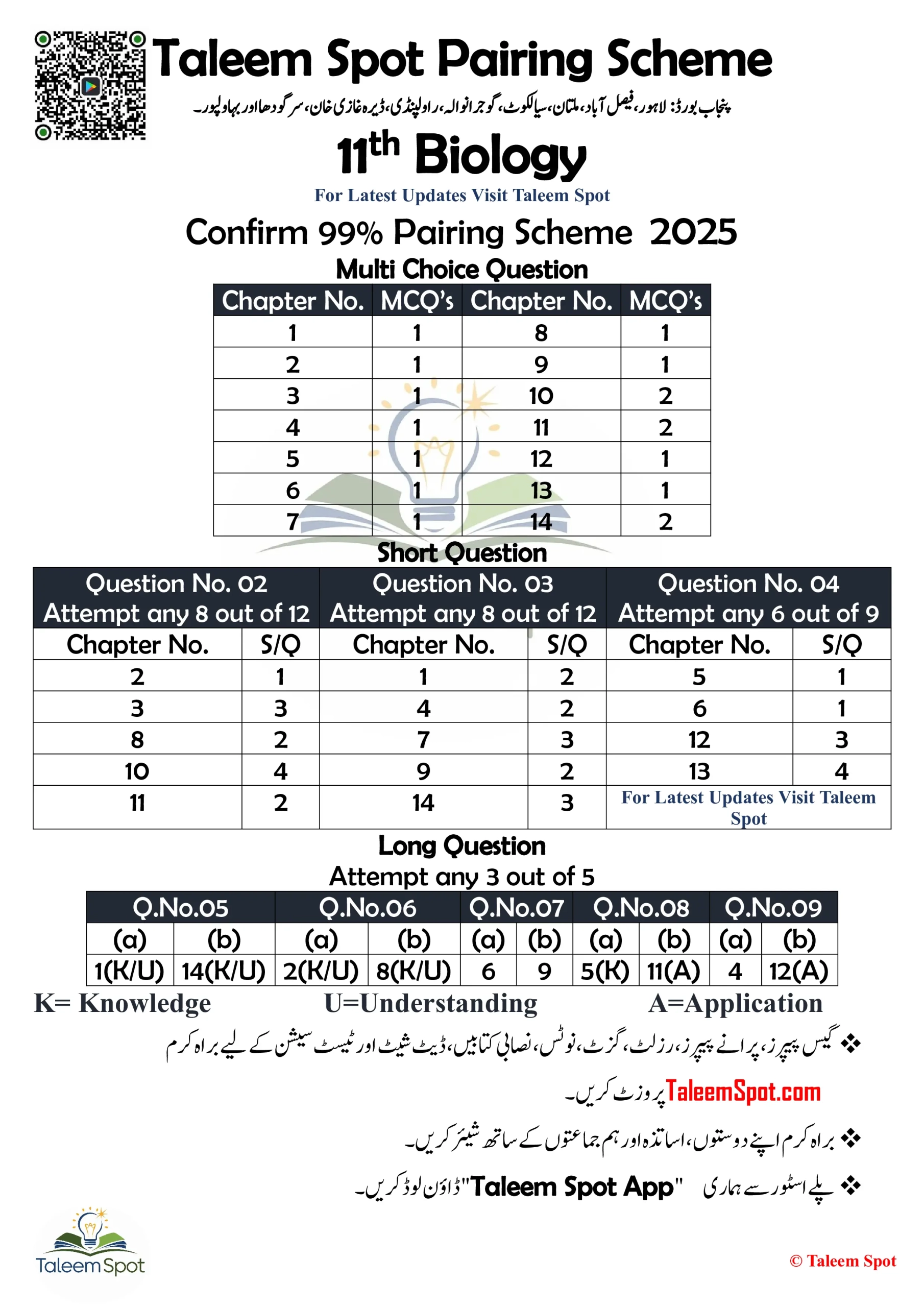11th Class Biology Pairing Scheme Punjab Board 2025

The 11th Class Biology Pairing Scheme Punjab Board 2025 is a critical tool for students preparing for their board exams. This pairing scheme provides insights into the structure of the Biology exam, ensuring that students can prioritize their studies effectively. Designed specifically for Punjab Boards, including Lahore, Rawalpindi, Multan, Gujranwala, Faisalabad, Bahawalpur, Sahiwal, Sargodha, and Dera Ghazi Khan, this scheme simplifies the preparation process by highlighting key chapters and their pairing for long and short questions.
Biology at the 11th-grade level demands a conceptual understanding of various topics, from cellular structures to plant and human physiology. This pairing scheme bridges the gap between effort and result, helping students achieve excellent marks with strategic preparation.

All Subjects Pairing Scheme : Visit Here
What Is the 11th Class Biology Pairing Scheme?
The 11th Class Biology Pairing Scheme Punjab Board 2025 outlines the distribution of questions across chapters. It categorizes the paper into MCQs, short questions, and long questions, pairing chapters to help students focus their efforts efficiently.
Key Features of the Pairing Scheme
- Chapter-Wise Pairing: Highlights which chapters are paired for long and short questions.
- Exam Format Clarity: Offers a clear structure of the Biology exam.
- Strategic Preparation: Helps in identifying high-priority topics.
- Conceptual Focus: Guides students to focus on critical areas requiring deeper understanding.
Benefits of Using the 11th Class Biology Pairing Scheme Punjab Board 2025
1. Simplifies Study Planning
With the pairing scheme, students can focus their preparation on chapters with higher importance in long and short questions. For example, chapters on “Enzymes” or “Cell Structure” might frequently appear in long questions.
2. Boosts Confidence During Exams
Knowing how chapters are paired for questions reduces anxiety. Students can enter the exam hall with a clear strategy on which sections to prioritize.
3. Saves Time
By focusing on paired chapters, students save time and effort that would otherwise be spent covering less significant material.
4. Maximizes Scoring Potential
Long questions often carry substantial marks. The pairing scheme ensures students are prepared to attempt these sections confidently, maximizing their score.
5. Applicable to All Punjab Boards
Whether you’re appearing under Lahore, Rawalpindi, or Multan Boards, the pairing scheme is standardized across all Punjab Boards, making it a universal resource.
Effective Study Strategies Using the Biology Pairing Scheme
1. Master Long Question Pairings
The 11th Class Biology Pairing Scheme Punjab Board 2025 specifies which chapters are paired for long questions. For instance, if “Chapter 1: The Cell” is paired with “Chapter 4: Enzymes,” students should prioritize these chapters for in-depth preparation.
2. Focus on Short Questions
Short questions often test fundamental concepts. Use the pairing scheme to identify chapters with high short-question frequency and revise these regularly.
3. Don’t Overlook MCQs
MCQs contribute significantly to the overall score. The pairing scheme helps identify chapters that are frequently tested in this section, such as chapters on “Biological Molecules” and “Transport in Plants.”
4. Allocate Time According to Weightage
Divide your study time based on the pairing scheme. Dedicate more hours to chapters that are paired for both long and short questions.
5. Combine Pairing Scheme with Past Papers
Solving past papers in conjunction with the pairing scheme provides a realistic understanding of the question patterns and ensures comprehensive preparation.
Subjects Covered in the Pairing Scheme
The 11th Class Biology Pairing Scheme Punjab Board 2025 covers all major topics from the syllabus, including:
- Cell Structure and Function: Focus on organelles, cell types, and functions.
- Biological Molecules: Structure and function of carbohydrates, proteins, and lipids.
- Enzymes: Mechanisms, functions, and significance.
- Bioenergetics: Photosynthesis and cellular respiration.
- Transport: Transport in plants and animals.
- Coordination and Control: Nervous and hormonal systems.
- Gaseous Exchange: Mechanisms in humans and plants.
- Excretion: Processes in plants and animals.
These topics are paired strategically in the scheme to ensure comprehensive coverage of the syllabus.
Region-Specific Highlights
The pairing scheme is tailored for all Punjab Boards to ensure uniformity while addressing the specific needs of each region:
- Lahore Board: Emphasis on enzymatic functions and cell structure.
- Rawalpindi Board: Focuses on bioenergetics and transport mechanisms.
- Multan Board: Prioritizes coordination and control systems.
- Gujranwala Board: Highlights the significance of biological molecules.
- Faisalabad Board: Focuses on cellular respiration and photosynthesis.
- Bahawalpur Board: Covers nervous system mechanisms and hormonal functions.
- Sahiwal Board: Includes transport in plants and gaseous exchange.
- Sargodha Board: Emphasizes excretion and plant physiology.
- Dera Ghazi Khan Board: Highlights MCQs on bioenergetics and enzymatic reactions.
Findings
The 11th Class Biology Pairing Scheme Punjab Board 2025 is a powerful resource for students to streamline their exam preparation. By understanding the distribution of questions and pairing of chapters, students can approach their studies strategically, focusing on high-priority areas and maximizing their scoring potential.
This resource is not only helpful in organizing study plans but also boosts confidence by providing clarity on the exam format. When used alongside past papers and regular revision, it ensures success in Biology exams across all Punjab Boards.
FAQs
1. What is the 11th Class Biology Pairing Scheme?
The pairing scheme outlines the distribution of long, short, and MCQ questions across chapters for the Biology exam.
2. Is this pairing scheme valid for all Punjab Boards?
Yes, the scheme is standardized for Lahore, Rawalpindi, Multan, Gujranwala, Faisalabad, Bahawalpur, Sahiwal, Sargodha, and Dera Ghazi Khan Boards.
3. How can the pairing scheme help in preparation?
It helps students prioritize chapters, focus on paired sections for long questions, and plan their study time effectively.
4. What chapters are covered in the pairing scheme?
Key chapters include “Cell Structure,” “Biological Molecules,” “Enzymes,” “Bioenergetics,” and “Coordination and Control.”
5. Does the pairing scheme include MCQs?
Yes, it highlights chapters with high MCQ frequency, such as “Biological Molecules” and “Transport in Plants.”
6. Can the pairing scheme guarantee better marks?
While it improves preparation efficiency, success also depends on consistent practice and understanding of the syllabus.
7. Where can I access the pairing scheme?
The scheme is available for free on educational platforms like TaleemSpot.com.
8. Should I combine the pairing scheme with past papers?
Yes, combining the pairing scheme with past papers enhances understanding and ensures better performance in exams.
9. Are short questions included in the pairing scheme?
Yes, the pairing scheme specifies chapters that contribute significantly to short questions.
10. How often should students revise using the pairing scheme?
Students should revise paired chapters regularly, focusing on long and short questions based on the scheme.





Is this scheme the authentic one or not